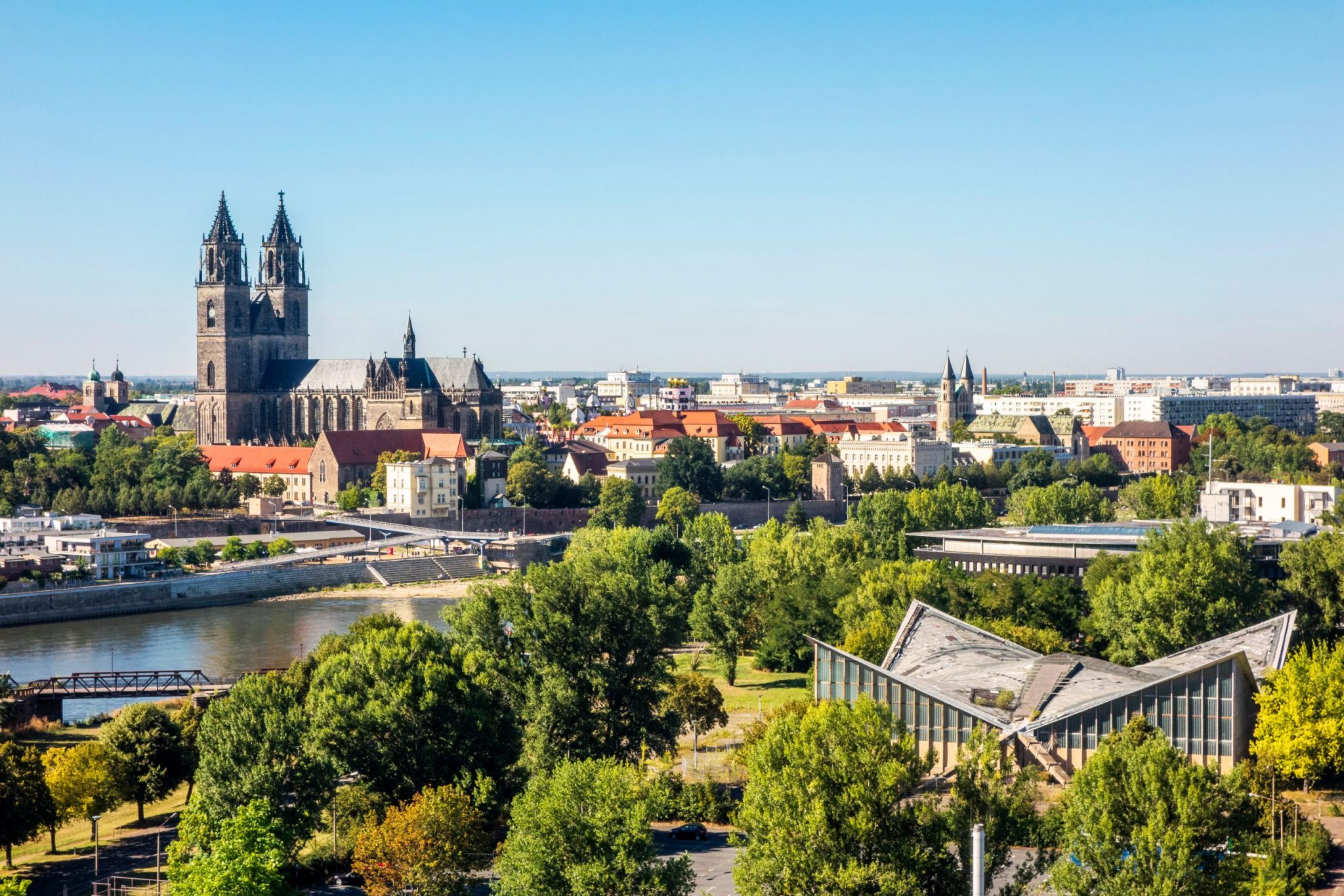What We’re Seeing on the 2021 German Elections Dashboard
In June, as in previous months, foreign state-backed media and diplomatic accounts actively engaged in online German political discourses, at times manipulating information. Russian actors continued to disseminate anti-vaccination narratives, though less so than in previous months, and their focus on other issues, especially foreign policy, grew in June. They negatively portrayed the Sachsen-Anhalt regional elections and top political candidates, especially Annalena Baerbock. Russian actors’ narratives on foreign policy issues, including NATO, Nord Stream 2, and tensions in the Black Sea, echoed the Kremlin’s positions and presented incomplete information. Russian state-backed accounts continued to give more attention to the German elections and domestic German concerns than monitored Turkish, Iranian, or Chinese accounts.
China continued its focus on domestic Chinese issues, highlighting the achievements of the Chinese Communist Party and continuing to positively depict Xinjiang. Turkish accounts focused on the NATO summit, the Kurdish PKK’s violent actions, and alleged incidents of Islamophobia in Germany and other western countries. Iran praised its own presidential elections and accused western institutions of wrongdoing.
Russia
Covid-19
In June, Russian state-backed actors’ coverage of coronavirus-related topics decreased slightly. Across all foreign and domestic media monitored by the dashboard, “corona” was the most mentioned hashtag, as well as the top key phrase. In contrast, for Russian state-backed media, “corona” was only the second most mentioned hashtag and did not appear among the top ten key phrases. Despite the shrinking numbers of coronavirus-related tweets, Russian German-language media was still active in pushing its familiar anti-vaccination narratives. RT Deutsch’s most popular tweet in June raised doubts about the security of the BioNTech/Pfizer vaccine. The outlet also maintained its position as the most influential Twitter account of all the accounts monitored on the dashboard for the key phrase “vaccine.” And on RT Deutsch’s YouTube channel, the three most-viewed videos of the month (totaling nearly 1.5 million views) all promoted vaccine skepticism, including one linking vaccines to changes in female menstrual cycles.
German election campaigns
Sachsen-Anhalt
State elections took place in Saxony-Anhalt over the first weekend of June. RT Deutsch widely covered the event, with the hashtag “#SachsenAnhalt” among the top ten hashtags for the account in June. The most popular tweets for that hashtag illustrate some of the key narratives that RT Deutsch has disseminated about the election. Generally, these tweets negatively portrayed the election, as well as German media outlets’ coverage of it. RT Deutsch pointed to low participation in the election, highlighted allegedly biased reporting by the public broadcaster ARD and claimed that pre-election polling has influenced the election results in favor of the Christian Democratic Union (CDU). It also echoed the Alternative for Germany’s (AfD) claim that the party’s election results, though falling short of AfD’s expectations, could be assessed as a success given the party’s unfavorable treatment by the media. Prior to the election, RT Deutsch used the hashtag “#Protestwahl” (protest vote) to imply great dissatisfaction among voters—a claim that the election’s outcome and the clear victory of incumbent Minister President Reiner Haseloff clearly disprove. SNA, the German-language Sputnik News outlet, also covered the elections and contributed to creating emotionally heightened narratives.
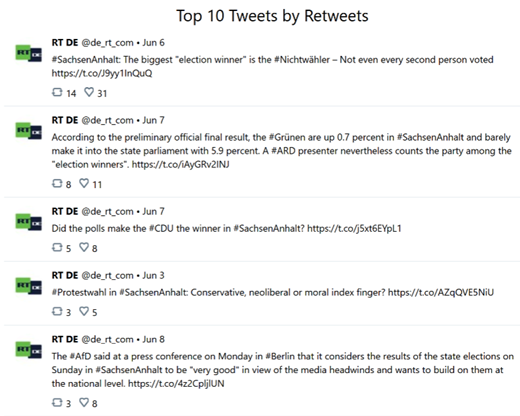
The top tweets by RT Deutsch using the hashtag “#SachsenAnhalt” between June 1 and June 30, 2021.
Russian state-backed media also attempted to stoke East-West divisions both before and after the election. These articles and tweets featured die Linke’s (the far-left party) accusations of West Germans’ “arrogance” in their understanding of the formerly East German states. Moreover, RT Deutsch and SNA discussed statements made by the federal government’s commissioner for the new German states that East German voters had been “socialized by dictatorship,” which served to further promote anger over East-West divisions.
SNA also dove into the question of election fraud. Immediately after the Sachsen-Anhalt elections, AfD supporters alleged voter fraud in the election, echoing fraud allegations that emerged after the 2020 U.S. election. SNA amplified these allegations.
Federal Election Campaign
In June, Russian state-backed media exposed all three chancellor candidates to substantial, mostly negative coverage. The graph below illustrates Russian and German media accounts’ coverage of all three chancellor candidates. Compared to German media outlets, Russian coverage of CDU candidate Armin Laschet and Social Democratic Party (SPD) candidate Olaf Scholz was limited, with only a few peak moments. However, Green candidate Annalena Baerbock received significantly more criticism, most of which was centered around different plagiarism charges. In May, Annalena Baerbock was the only candidate to receive negative attention from Russian state-backed actors.
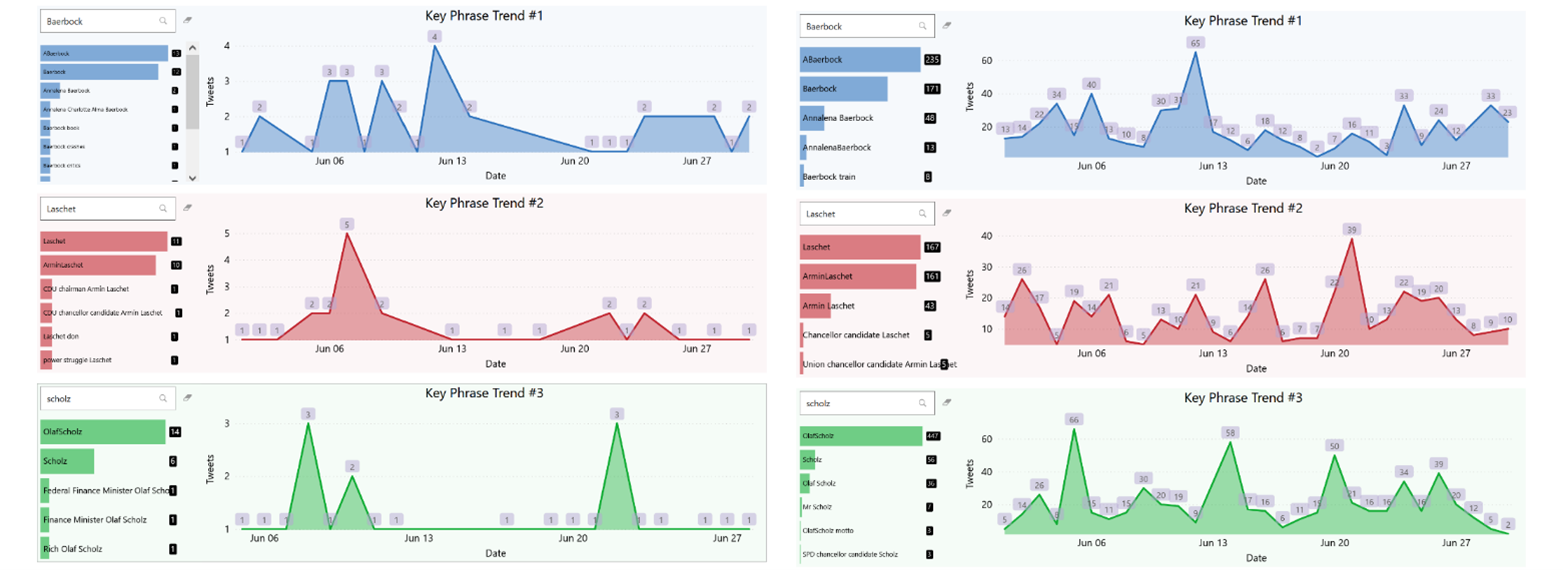
Mentions of Annalena Baerbock, Armin Laschet, and Olaf Scholz between June 1 and June 30, 2021 by Russian state-backed media (left) and German media (right).
Besides echoing accusations of plagiarism, RT Deutsch also used its platform to increase the reach of other manipulative tweets about the Green candidate. The outlet shared a tweet by the right-wing CDU candidate for the Bundestag and former president of the Office for the Protection of the Constitution, Hans-Georg Maaßen, attempting to discredit Annalena Baerbock with the far-fetched idea of linking her initials with an anti-police acronym, without further contextualization.

Russian state-backed accounts also reported on a deadly knife attack that happened on June 26 in the city of Würzburg. In their respective top tweets, RT Deutsch and SNA highlighted that the Somali attacker allegedly yelled “allahu akbar” and had spoken of “jihad,” stoking anti-immigrant and anti-Islamic sentiments.
Pride Month: UEFA and the LGBTQ+ Issues
In response to an anti-LGBTQ+ law in Hungary, the city of Munich wanted to light its football stadium in rainbow colors for the Germany vs. Hungary match, but the Union of European Football Associations (UEFA) denied the request. RT Deutsch and SNA covered these events and other “rainbow” related issues in June, which is Pride Month, drawing attention to pride marches in Paris and Seattle. In the latter instance, RT Deutsch bundled LGBTQ+ concerns with the controversial issue of “white reparations.” This follows a general trend of LGBTQ+ issues receiving significant, and often negative, attention by Russian state media.
RT Deutsch jumped into the Munich “rainbow affair” in full force, live streaming the lighting of the Munich town hall in rainbow colors on the day of the Hungary game in Munich. It also covered an AfD politician’s opposition to German soccer players wearing rainbow armbands. SNA also tweeted quotes of the AfD politician’s rainbow armband objection, using the same derogatory terminology he used without providing context or distancing itself from the slur. After the game, RT Deutsch’s YouTube and Twitter content suggested “Rainbow Double Standards,” criticizing conservative politicians who had voted against the legalization of gay marriage in 2017 and who were now attempting to portray themselves as LGBTQ+ allies in the context of the situation in Hungary. SNA, meanwhile, conducted a survey on readers’ opinions on lighting the stadium in rainbow colors; 83 percent of participants responded that this should have nothing to do with soccer.
Foreign Policy
Russian state-backed media extensively covered events relating to NATO in June. RT Deutsch was one of the most active monitored accounts for the key words “NATO summit,” and it was the most influential account for the key phrase “NATO.”
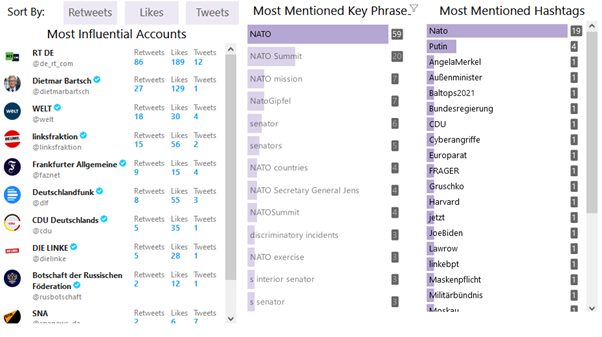
Most influential accounts for the key phrase ”NATO” between June 1 and June 30, 2021.
In its coverage, RT Deutsch criticized NATO’s general strategy and particularly its policy toward Ukraine. Russian President Vladimir Putin compared NATO’s support for Ukraine with Russia stationing missiles at the U.S.-Mexican border—a claim directly regurgitated by RT Deutsch. Other top tweets about NATO by Russian state-backed actors presented the view that NATO is the aggressor that is encroaching on the Russian border and forcing Russia to further militarize itself for defensive purposes. At the same time, RT Deutsch claimed that NATO decided to react to cyberattacks with nuclear force, whereas Putin was said to call for cooperation in cyberspace.
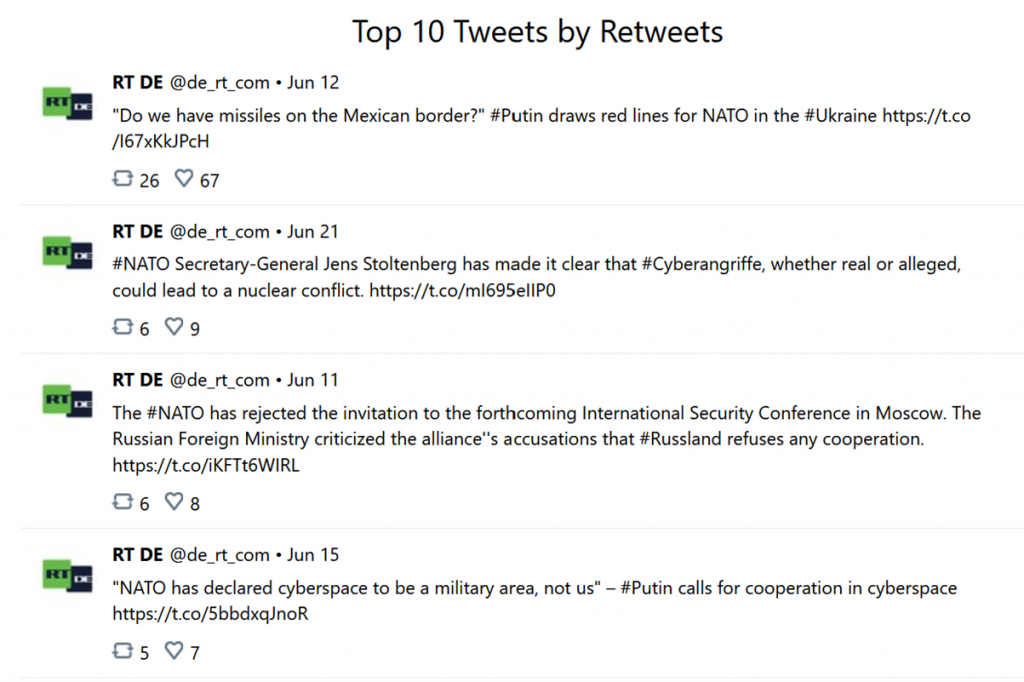
The four most retweeted tweets by Russian state-backed media with key phrase “NATO” between June 1 and June 30, 2021.
Compared to German media, Russian state-backed media also paid more attention to incidents between Russian forces and a British and a Dutch military ship in the Black Sea, as the graph below illustrates.
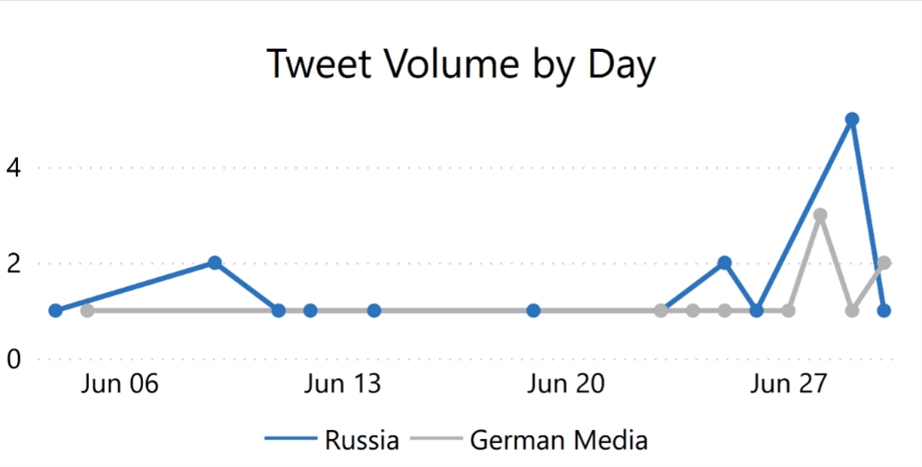
Mentions of “Black Sea” by monitored Russian and German media accounts between June 1 and June 30, 2021.
RT Deutsch interpreted the alleged Russian warning shots on the British HMS Defender in the Black Sea as another incident demonstrating the West’s surprise over Russia’s new assertiveness. Regarding the incident with the Dutch military ship, RT Deutsch cited the Russian government’s position without any contextualization.
Early in the month, Russian state-backed actors also demonstrated a renewed focus on Nord Stream 2 in the context of the St. Petersburg International Economic Forum. In the first week of June, Nord Stream 2 was the third most mentioned key phrase and hashtag by Russian state-backed accounts. The pipeline was also mentioned in at least 45 SNA News and RT Deutsch articles during the month, including one that quoted Free Democratic Party leader Christian Lindner’s alleged claim that “there have been mistakes in dealing with Russia in the past.” In contrast, neither the forum nor the disputed pipeline received significant attention from German accounts during that period.

Mentions of “Nord Stream 2” by Russian-backed and German media between June 1 and June 6, 2021.
Interestingly, while German media outlets discussed comments by President Putin questioning the continuation of gas flows through Ukraine, Russian media did not draw attention to Putin’s threats but rather focused on progress and praise for Nord Stream 2. The most far-reaching tweets emphasized Putin’s excitement over the completion of the first strand of the Nord Stream 2 pipeline, as well as Austrian Chancellor Sebastian Kurz’s praise for the project and dismissal of criticism of the pipeline. RT Deutsch’s YouTube channel also broadcast Kurz’s statement.
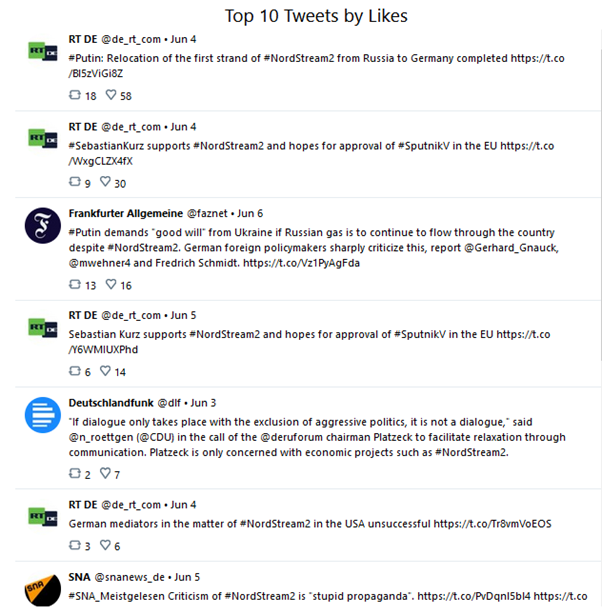
Top tweets by likes for hashtag “#NordStream2” by Russian and German media between June 1 and June 6, 2021.
Turkey
Turkish state-backed outlet TRT Deutsch also covered the NATO summit extensively; after RT Deutsch, it was the most influential account on the key phrase “NATO summit.” TRT Deutsch’s coverage revolved primarily around the positively received meetings between Turkish President Recep Tayyip Erdoğan and German Chancellor Angela Merkel and U.S. President Joe Biden. Turkish accounts also focused on the Antalya Diplomacy Forum in June. The Turkish diplomatic accounts monitored on the Dashboard very actively retweeted the event’s account, pushing @AntalyaDF to become one of the top mentions for all monitored accounts.
Turkish state-backed outlets also focused on narratives emphasizing violent actions they attributed to the Kurdish PKK party. Four out of the top ten most-liked tweets by Turkish-backed accounts in June covered the PKK, highlighting the terrorist nature of the organization.
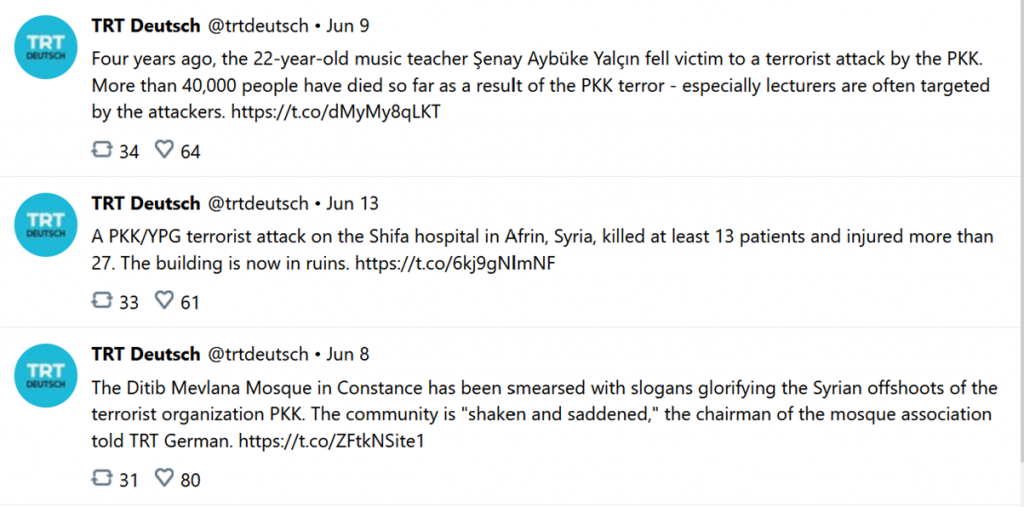

Four of the most-liked tweets by Turkish state-backed accounts between June 1 and June 30, 2021.
Turkish state-backed accounts also focused on Islamophobia and crimes that these accounts classified as anti-Islamic throughout June. Although the focus of the monitored accounts on the dashboard is Germany, they also highlighted crimes that happened in other western countries, including Canada and France.
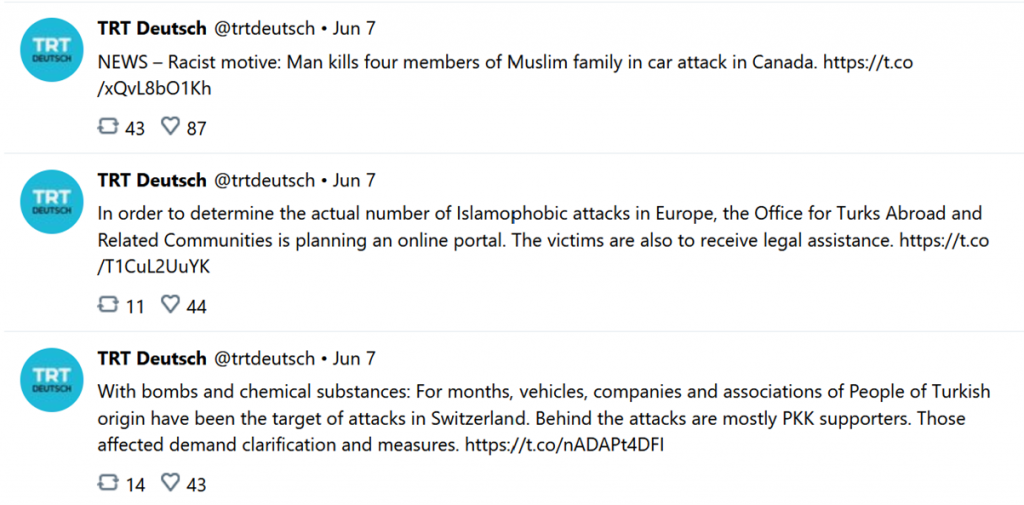
The three most-liked tweets by Turkish state-backed media from June 1 – June 7.
Turkish accounts also reported on the knife attack in Würzburg. In contrast to Russian state-backed media, the top Turkish reports highlighted an Iranian refugee’s courageous attempt to stop the attacker, and they shared the Islamic association Ditib’s call for “solidarity and harmony” in response to the attack. Other tweets demonstrated a sober, descriptive tone, which was a clear attempt to prevent anti-Islamic sentiment related to the crime.
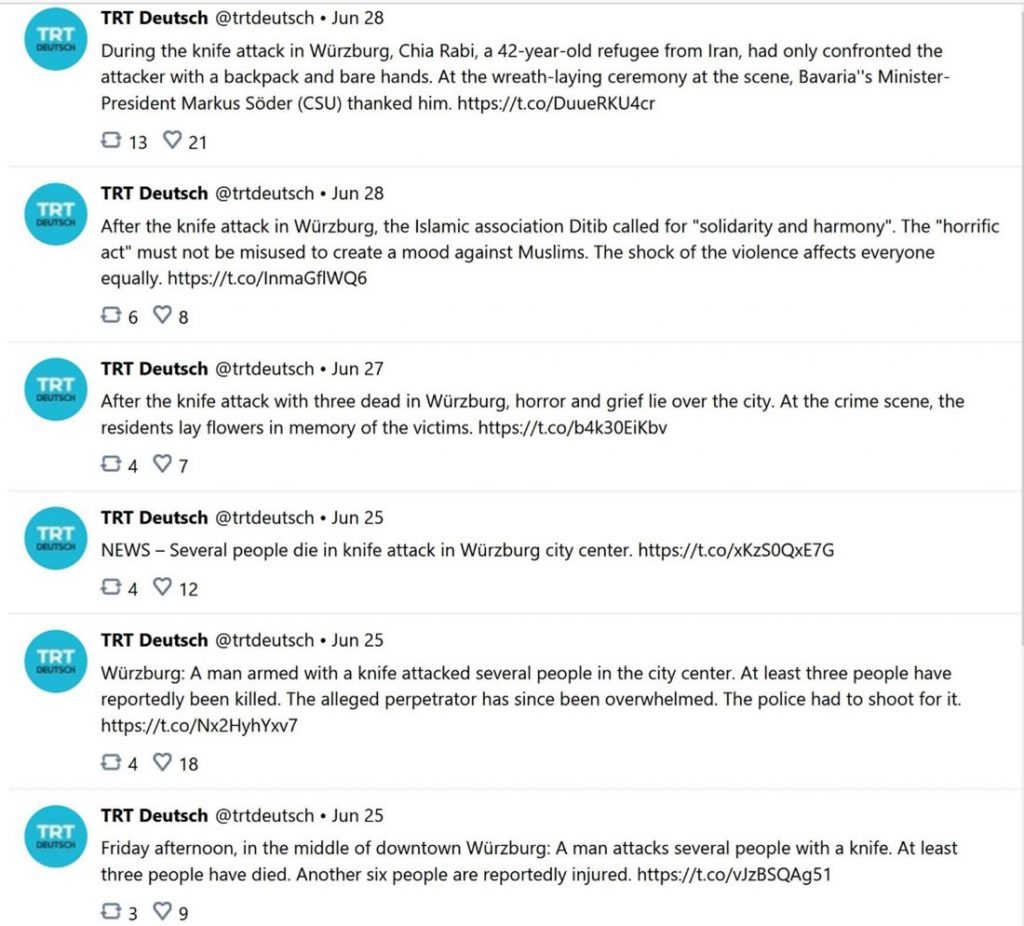
Six of the most-liked tweets by Turkish state-backed actors for the key phrase “Würzburg” between June 1 and June 30, 2021.
China
Chinese accounts continued their focus on domestic affairs, paying particular attention to the Chinese Communist Party’s then-upcoming 100th anniversary on July 1. The most popular hashtag and key phrase for Chinese actors in June was “CPC100.” In the context of the anniversary, the Chinese embassy also published a variety of tweets with the hashtag “12Codes,” characterizing the party’s identity with 12 codewords such as democracy, socialism, green, and economic miracle. Chinese accounts claimed that these “12 codes” are key to understanding China and Chinese thinking, equating China and the Chinese people with the Communist Party. This campaign aims to “decode” the party and the country on its own terms by linking them with positively associated characteristics.

Under the keyword “democracy,” a tweet from the Chinese embassy claimed that China is “more of a democracy” than countries in the West. This was the most retweeted tweet under the hashtag “12codes.”
As in previous months, the Xinjiang region received particular attention. In their coverage, Chinese actors mostly highlighted technological advancements in the region, such as highways, or drew attention to the Uyghur population’s growth, which they claimed serves to refute allegations of genocide. Moreover, the Chinese Embassy in Germany criticized a statement by a Bundestag committee on the situation in Xinjiang.
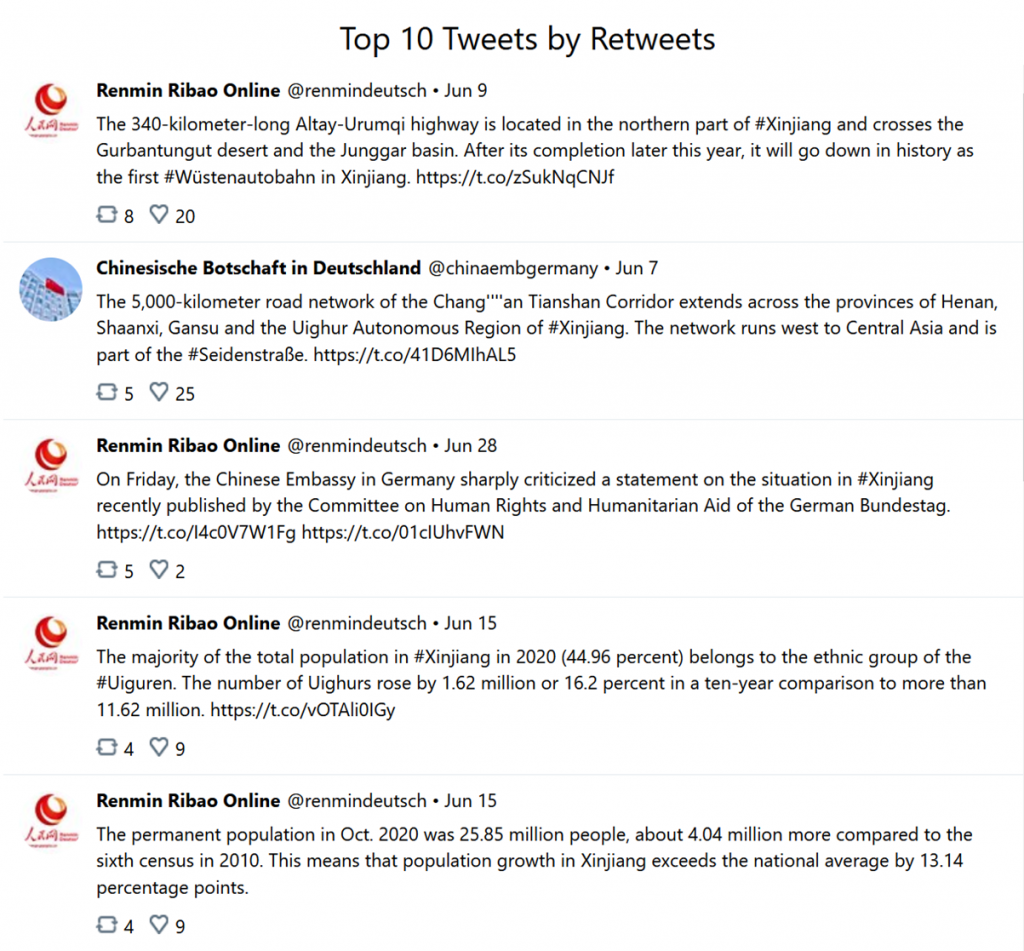
Top ten most retweeted tweets for key phrase “Xinjiang” between June 1 and June 30, 2021.
Foreign policy events such as the G7 meeting, the NATO summit, and the meeting of the G20 foreign ministers on combatting the Covid-19 pandemic received limited coverage. A few tweets emphasized China’s dissatisfaction with being seen as a threat by NATO member states or Russian President Putin’s refusal to see China as a threat. These tweets did not receive wide attention.

Iran
In June, Iranian state-backed accounts mostly focused on the Iranian presidential elections held on June 18 and stuck to topics related to Iran’s interests. Most tweets focused on vote casting at the Iranian Embassy and consulates in Germany. Tweets from the Islamic Republic News Agency IRNA also cited Ayatollah Khamenei’s portrayal of the elections as a serious blow to Iran’s enemies and alleged unprecedent voter turnout, which has been discounted by international media coverage.

Two out of the top ten most retweeted tweets by Iranian-backed accounts between June 1 and June 30.
With regards to foreign policy, Iranian accounts covered progress in JCPOA (Iran Nuclear Deal) negotiations. The accounts accused NATO and the G7 of breaking international law while lecturing other countries on these principles.

In a tweet commemorating the assassination of Mohammad Beheschti in 1981, the Iranian Embassy criticized the handling of members of the People’s Mujahedin Organization of Iran (MOK) in European countries.
Conclusion
Germany’s key political and economic role in Europe and beyond means that there is also a lot at stake for countries such as Russia, China, Turkey, and Iran in Germany’s federal election in September. From economic sanctions against Russia, the situation of Turks in Germany, trade relations with China, to the future of the JCPOA, each country has an interest in the outcome of the election. The particular focus of messaging by the different actors reflects their distinct goals and strategies in the run-up to the federal elections. As the election campaign nears its climax in the late summer, ASD and GMF will continue to monitor these actors’ engagement with German political discourse and their information manipulation efforts.
The views expressed in GMF publications and commentary are the views of the author alone.

